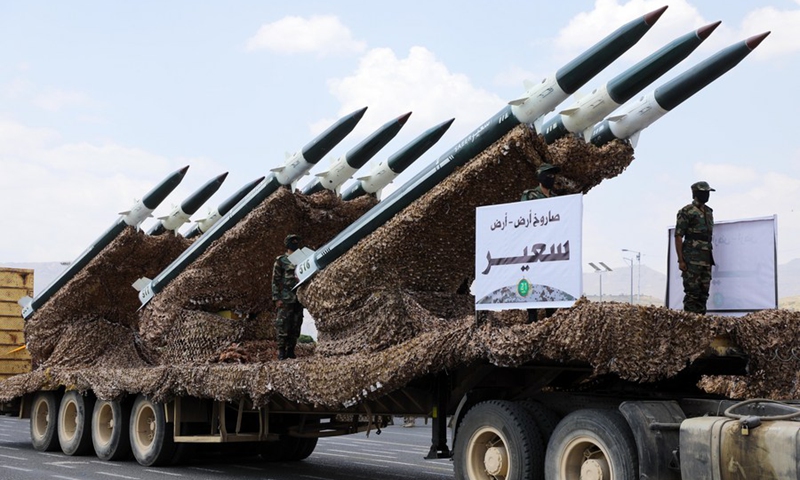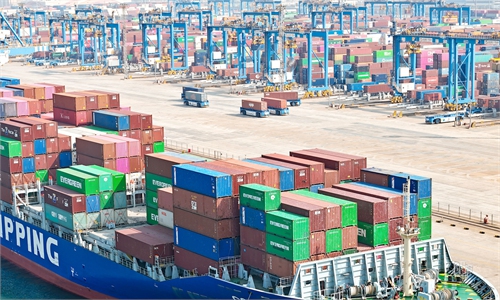US still making no real efforts for cease-fire; ‘spillover effect of Gaza crisis to be seen in more regions’

Missiles are seen during a military parade held by the Houthi group in Sanaa, Yemen.(Photo: Xinhua)
US President Joe Biden has not asked Israeli Prime Minister Benjamin Netanyahu for a cease-fire in Gaza, even though the crisis has spilled over to more and more regions as attacks targeting ships related to Israel have occurred not only in the Red Sea but also in the Indian Ocean.Chinese analysts said that the navigation problem brings pressure to everyone along trade routes, but the conflict and humanitarian crisis in Gaza are the cause of these attacks. Arab and Islamic countries in the region are divided about how to deal with the problem, so before the end of the conflict, it is unlikely that attacks against Israel-linked ships will come to a halt.
According to the statement released by the White House on Saturday, leaders of the US and Israel discussed "Israel's military campaign in Gaza" to include its objectives and phasing. Biden emphasized "the critical need to protect the civilian population including those supporting the humanitarian aid operation," and "the importance of allowing civilians to move safely away from areas of ongoing fighting."
Biden told the media on Saturday that he "did not ask Netanyahu to negotiate a cease-fire," despite rising pressure to do so. Pro-Palestinian protesters launched a "No Christmas as usual" campaign, and took to the streets on "Super Saturday" en masse in multiple major Western cities including New York, Chicago, Los Angeles, London and Toronto.
The "Shut it Down for Palestine" movement, made up of pro-Palestinian groups, had plans to "organize actions to boycott, disrupt, and rally at commercial centers on December 23," according to the website of the ANSWER Coalition activist group, the Hill reported. Protesters in New York City appeared to be chanting, "While you're shopping, bombs are dropping."
In the US, people who sympathize with Palestinians are mainly voters who intended to support Biden rather than Donald Trump, so in order to respond to these people, Biden must do something. However, he has yet made efforts for a cease-fire, as Jewish groups are also important for Biden as key funders of Democratic candidates, analysts noted, saying that the Biden administration is facing an embarrassing situation. What Biden is trying to do at the moment is just political gesturing, and it has nothing to do with the situation in Gaza.
"This is a key moment for the crisis, in fact, Israel's major military activities have almost finished, while the Netanyahu administration needs to consider how to end this conflict in a dignified way and avoid political and governance burden in Gaza, Wang Jin, an associate professor at the Institute of Middle Eastern Studies at Northwest University, told the Global Times on Sunday, noting the US is actually trying to help Israel find a good timing and pretext to end this conflict with 'dignity' to some extent."
Spillover effect
On Saturday, the attacks that target Israel-linked ships occur in Indian Ocean, which is the latest sign of risks expanding to commercial shipping beyond the Red Sea. Reuters reported that a "Liberia-flagged, Japanese-owned, and Netherlands-operated chemical tanker" struck Saturday off the coast of India was targeted by a drone "fired from Iran," the Pentagon said in a statement.
The attacks launched by some non-state actors in the region to some extent fit the demand among the Islamic world to support Palestinians in Gaza while the governments of those Arab and Islamic countries are unable to take any direct action to pressure Israel effectively. This is why most Arab and Islamic countries refused to join the US-led joint patrols and also refused to directly condemn the Houthi militia in Yemen. Some might even tolerate these attacks, said Song Zhongping, a Chinese military expert and TV commentator.
"Washington might want to use this incident to hype another civil war in Yemen so that it can force Saudi Arabia to return to the battle fields in Yemen, and then undermine the recovering ties between Riyadh and Tehran. But this attempt is unlikely to succeed," Song told the Global Times on Sunday.
Liu Zhongmin, a professor at the Middle East Studies Institute of Shanghai International Studies University, echoed that "joining the US-led and Israel-supported multinational patrol at this moment to target the Houthis would go against the shared justice and morality among the Muslim world. The biggest political correctness shared by the Muslim world at this moment is about opposing Israel and supporting Palestine."
However, the attacks will also affect the interests of many countries in the region and even the major economies around the globe. Reuters reported on December 18 that the attacks launched by Yemen's Houthi group on commercial ships at the southern end of the Red Sea have prompted several shipping companies to divert vessels, avoiding a route that would take them through Egypt's Suez Canal in the north and its link to the Mediterranean Sea.
"Therefore, not only will Israel pay the price, but the attacks will also damage the interests of major regional countries like Egypt. The approach they will likely choose to solve the problem will be pressuring the US and Israel to end the conflict and open corridors for humanitarian aid to enter Gaza, rather than joining the US-led coalition to fight the Houthis," Liu said.
The joint patrol led by the US is a typical case of "curing the symptoms, not the disease," and the US needs to realize that the root cause is in Gaza, not Yemen. Once it makes real efforts to stop the conflict effectively, the problems in the Red Sea will dissipate. If not, the attacks will occur in more regions. The US won't be able to cover all of them, and more and more countries will be affected, and then the pressure on the Biden administration will greatly intensify, Liu noted.




